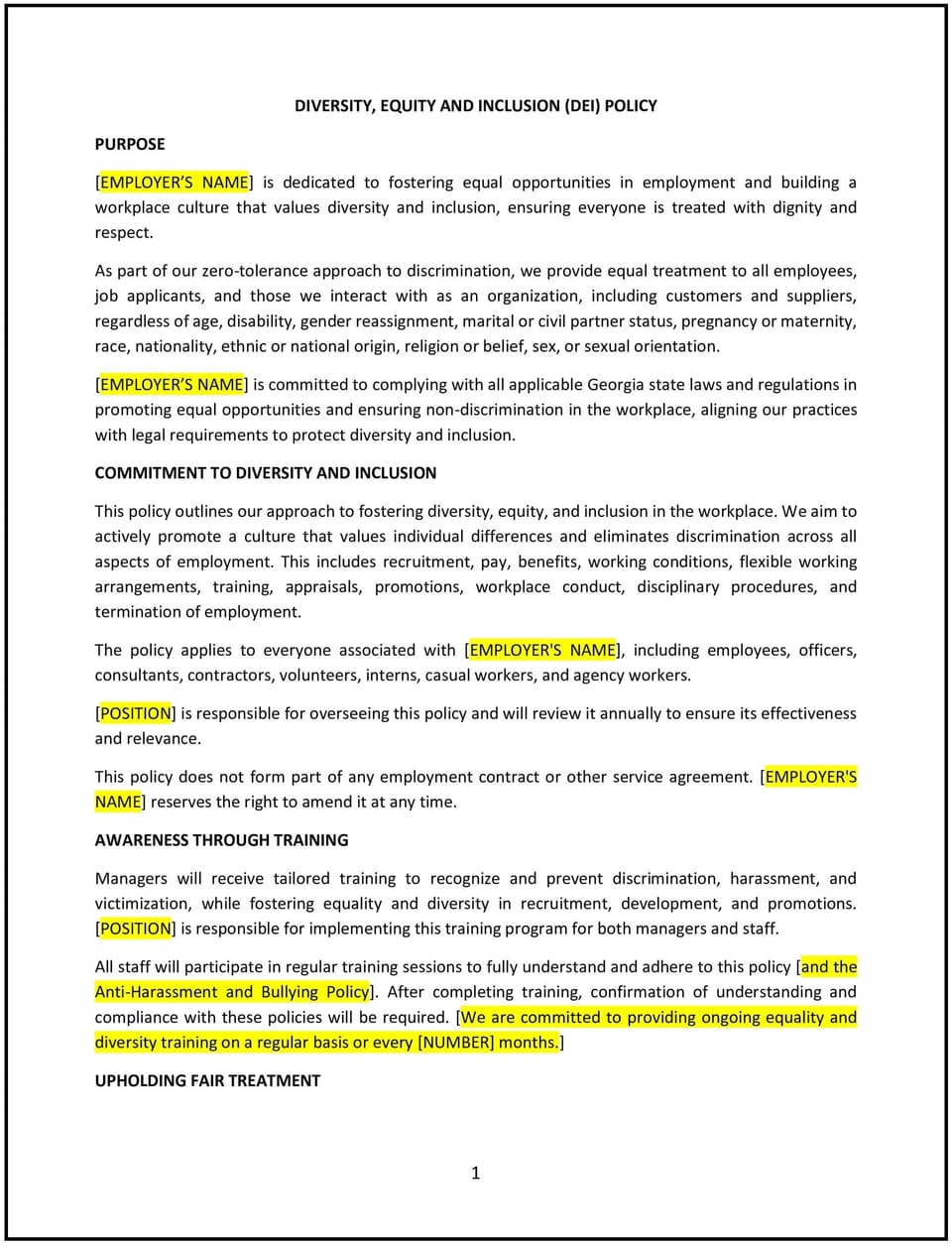Diversity, equity and inclusion policy (DEI) policy: Free template

Diversity, equity, and inclusion (DEI) policy (Georgia)
This diversity, equity, and inclusion (DEI) policy is designed to help Georgia businesses foster a workplace culture that values and respects individual differences. The policy outlines commitments to diversity, equitable practices, and inclusivity while providing guidance on promoting fair treatment and opportunities for all employees.
By implementing this policy, businesses can build a supportive, innovative, and thriving workplace that reflects the diverse communities they serve.
How to use this diversity, equity, and inclusion policy (Georgia)
- Define DEI principles: Clearly articulate what diversity, equity, and inclusion mean for your business, including specific goals such as improving representation or addressing biases.
- Commit to equitable practices: Outline your commitment to providing equal opportunities in hiring, promotion, and professional development.
- Promote inclusivity: Describe initiatives to create a welcoming environment, such as employee resource groups or inclusive communication training.
- Establish accountability: Designate individuals or teams responsible for implementing DEI initiatives and monitoring progress toward stated goals.
- Address discrimination and harassment: Include zero-tolerance policies for discriminatory practices and clear procedures for reporting and addressing such behavior.
- Encourage employee engagement: Invite employees to participate in DEI initiatives and provide feedback on their experiences to foster ownership and collaboration.
- Monitor and evaluate: Regularly review DEI efforts to identify successes, challenges, and areas for improvement.
- Review and update regularly: Periodically revisit the policy to reflect changes in Georgia-specific laws, workforce needs, or DEI best practices.
Benefits of using this diversity, equity, and inclusion policy (Georgia)
Implementing this policy provides several advantages for Georgia businesses:
- Enhances innovation: Diverse perspectives drive creativity and better decision-making.
- Attracts top talent: A commitment to DEI makes businesses more attractive to candidates seeking inclusive workplaces.
- Strengthens retention: Employees are more likely to stay with companies that value fairness and inclusivity.
- Improves workplace culture: A DEI-focused environment fosters respect, collaboration, and a sense of belonging.
- Reflects Georgia’s diversity: Tailoring the policy to local demographics ensures it resonates with employees and stakeholders.
Tips for using this diversity, equity, and inclusion policy (Georgia)
- Set measurable goals: Establish clear, actionable objectives for DEI initiatives, such as increasing diversity in leadership or improving training completion rates.
- Provide training: Offer regular DEI training to employees and leaders to raise awareness and address unconscious biases.
- Highlight success stories: Share examples of how DEI efforts have positively impacted the organization to encourage continued participation.
- Celebrate diversity: Recognize cultural events, achievements, and milestones that reflect the diversity of your workforce.
- Engage external expertise: Collaborate with DEI consultants or community organizations to enhance program effectiveness.
Q: What is the purpose of a DEI policy?
A: The purpose is to establish guidelines and commitments for creating a workplace that values diversity, promotes equity, and fosters inclusivity.
Q: How can businesses promote diversity in hiring?
A: Businesses should use inclusive job postings, recruit from diverse talent pools, and implement unbiased interview and selection processes.
Q: What initiatives can businesses implement to support inclusion?
A: Examples include employee resource groups, mentorship programs, and training on inclusive communication and workplace practices.
Q: Who is responsible for implementing DEI initiatives?
A: DEI efforts should involve collaboration across all levels of the organization, with specific accountability assigned to designated individuals or teams.
Q: How can businesses address discrimination or harassment?
A: Businesses should have clear reporting procedures, conduct prompt investigations, and enforce appropriate disciplinary actions to address discriminatory behavior.
Q: How can businesses measure the success of DEI efforts?
A: Businesses should track metrics such as workforce demographics, promotion rates, employee satisfaction surveys, and training participation.
Q: How often should this policy be reviewed?
A: The policy should be reviewed annually or whenever there are changes in Georgia’s legal framework, workforce demographics, or organizational goals.
This article contains general legal information and does not contain legal advice. Cobrief is not a law firm or a substitute for an attorney or law firm. The law is complex and changes often. For legal advice, please ask a lawyer.


